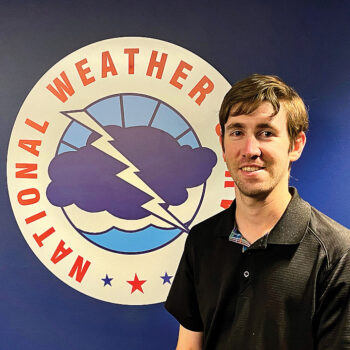
National Weather Service Meteorologist Sean Benedict (Source: NOAA’s National Weather Service)
Marilu Trainor
Multiple organizations, including the National Weather Service, Arizona Department of Health, and the Centers for Disease Control, have posted some important summer heat tips on their sites to help you keep your cool this summer.
Why are Older Adults More Vulnerable?
The CDC states older adults, those aged 65 and older, are particularly vulnerable to heat illness. Age is a risk factor, because older adults do not adjust as well to changes in temperature compared to when they were younger. They are also most likely to have a chronic medical condition that alters the body’s normal response to heat. Prescription medicine use is also common in older adults. Some prescription medicines can impair the body’s ability to regulate its temperature or can inhibit perspiration.
Be Prepared—Quick Tips about Heat:
* Listen to local weather forecasts and stay aware of upcoming temperature changes.
* Know those in your neighborhood who are elderly, young, sick, or overweight. They are more likely to become victims of excessive heat and may need help.
* Get trained in first aid, to learn how to treat heat-related emergencies.
* When it’s hot, wear lightweight, loose-fitting, and light-colored clothing to reflect heat and sunlight. Hats protect your face and scalp from harmful UV rays.
* Also, don’t forget to apply sunscreen liberally.
Stay Cool
* Use air conditioners: Spend time in air-conditioned locations if your home isn’t air conditioned, check your air conditioner and ducts to ensure it is working properly, and service it if necessary.
* Slow down: Reduce, eliminate, or reschedule strenuous activities until the coolest time of the day. Children, seniors, and anyone with health problems should stay in the coolest available place, not necessarily indoors.
* Use portable electric fans: Fans exhaust hot air from rooms or draw in cooler air. Do not direct the flow of portable electric fans toward yourself when room temperature is hotter than 90°F. The dry, blowing air will dehydrate you faster, endangering your health.
* Minimize direct exposure to the sun. Sunburn reduces your body’s ability to dissipate heat.
* Take a cool bath or shower.
Food and Water
* Eat light: Choose easy-to-digest foods such as fruit or salads. If you pack food, put it in a cooler or carry an ice pack. Don’t leave it sitting in the sun. Meats and dairy products can spoil quickly in hot weather.
* Drink plenty of water. Focus on non-alcoholic and decaffeinated fluids. Drink water even if you don’t feel thirsty. If you are on a fluid-restricted diet or have a problem with fluid retention, consult a physician before increasing consumption of fluids.
Always Remember:
* Each year, dozens of children and untold numbers of pets left in parked vehicles die from hyperthermia. Never leave children, disabled adults, or pets in a car.
* Protect your electronics: Don’t leave cell phones and GPS units sitting in hot cars.
For more heat and summer weather safety tips, go to www.weather.gov/safety/heat or visit the Centers for Disease Control and Prevention or Arizona Department of Health for additional information.
